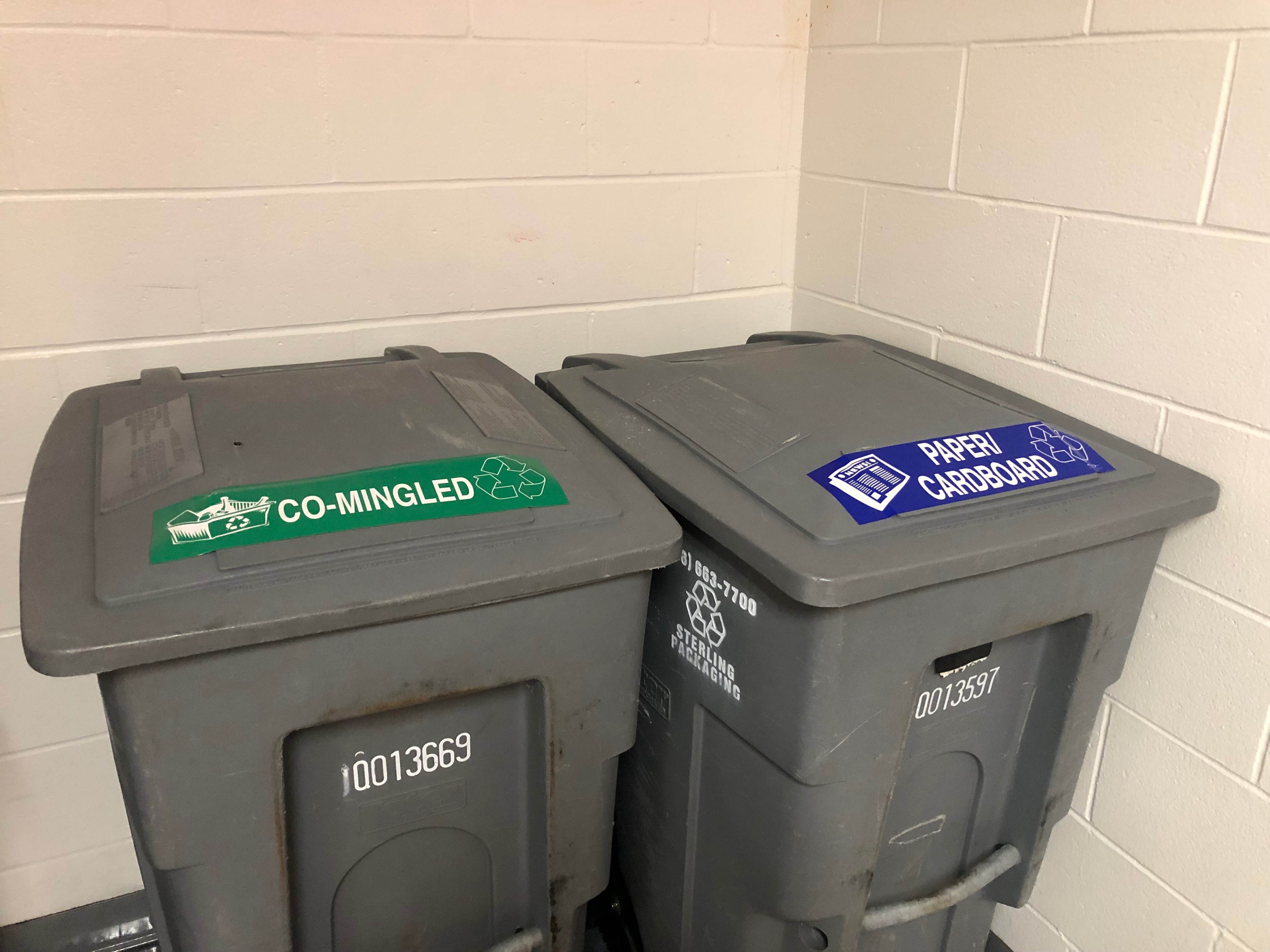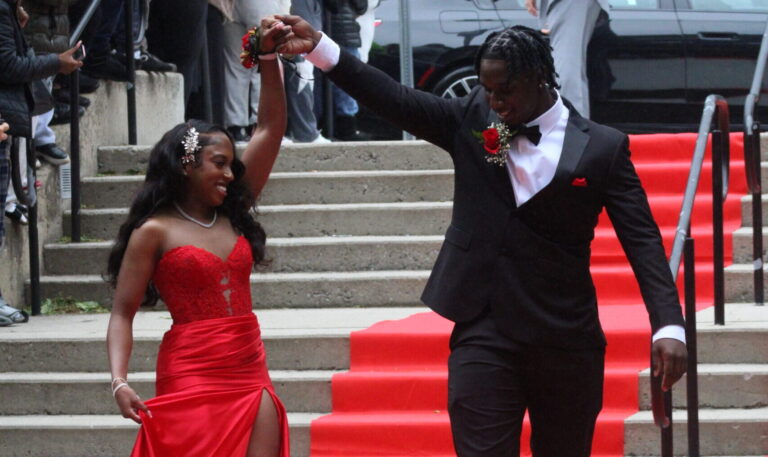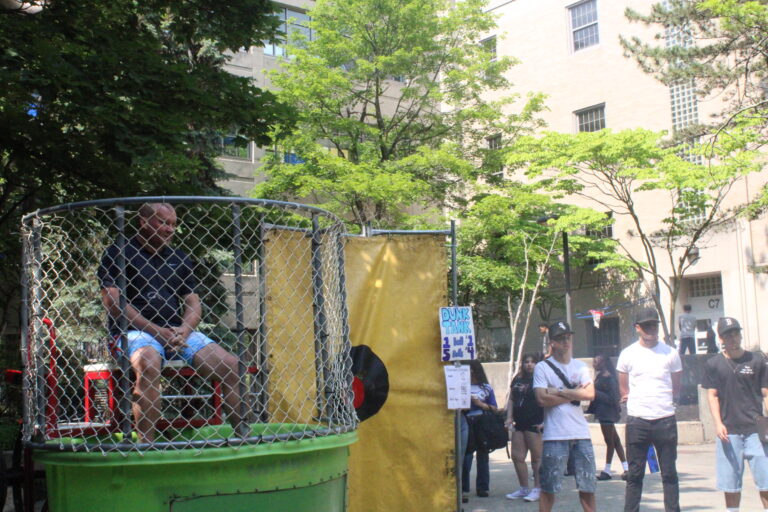
Recycling Barrels in 3rd Floor of the Boyle House. Photo taken by Julie Yu.
Malden High, for years, has had a paper only recycling system, and has not been recycling plastic waste.
Principal Chris Mastrangelo explained that “it has always been this way.” Malden High has never recycled plastic. However, Mastrangelo does not have a reason why.
With such a large school, using a large amount of paper throughout each week and even each day. Mastrangelo was told that “it has been becoming increasingly more difficult to get companies to come,” and pick up recycling. Before, picking up the recycling from the high school required no cost for companies, “but now since there is such a demand for recycling, [it is] costing the district.”
Mastrangelo explained that Malden High has established system that they follow. Each classroom has their own regular recycling bin and on top of that the school owns roughly 40 larger recycling barrels. Those 40 larger recycling barrels are split up, 20 of them are kept outside of the school and the other 20 are in the school. Once the 20 barrels inside of the school are full, they take them outside and bring in the 20 empty barrels from the outside, and the cycle continues and repeats.

As of now, the recycling company is not picking up Malden High recycled waste as frequently as desired by faculty. The school ran into the issue of filling up the recycling barrels too quickly before the company comes to pick it up.
Although this is not a definite answer, Mastrangelo thinks that not recycling plastic could be a way to simply “buy the school more time,” by limiting the recyclable materials in the recycling bins.
Mastrangelo shared that when he was in elementary school, recycling was a completely new concept. He recalled during his junior year of high school that “[he] did a fundraiser around recycling because there was no place for people to bring it.” He also mentioned that for many students at Malden High “recycling is almost as normal as brushing your teeth in the morning.”
Math teacher Joshua Abrams prior to the interview was not aware that Malden High does not recycle plastic, as he has been allowing students to use his recycling bin to dispose of paper and plastic. He expressed that he “wish[ed] [he] knew, because [he felt] bad for mixing the recycling.” Abrams explained his concerns with “the environmental situation being very important,” and how a relatively simple solution is recycling which everyone in the community should be doing.
English teacher Jennifer Clapp feels that “[it is] frustrating that [Malden High] does not recycle bottles and cans like [they] should.” She expressed that it is “bad enough that [students and staff] use them but [it is] even worse when [they] do not recycle them.” When Clapp found out about this news, she began to keep a small box in her room by the recycling bin where she let her students dispose of plastic products. She brings the waste home with her every week to dispose of it in her own recycling.
Clapp believes that part of this problem in additions the school’s funding issues is the fact that students may not have the proper knowledge on recycling, such as what can or cannot be recycled. She feels that “in school, within an academic setting, it would be the perfect place for students to learn.”
Italian teacher Adrienne D’Agostino feels that not recycling plastic “can be confusing, especially when no one knows where to throw plastic bottles away.” She thinks that during “one of the staff meetings [they] should brainstorm solutions and discuss what gets recycled, when does it get picked up, and how does it get picked up?”
Junior Sohaila Ammar found it “extremely upsetting that teachers and staff have been wanting to be more environmentally conscious, yet [they are] still not doing much about this epidemic.” She explained that one solution she has considered was going paperless. She thinks that in many classes it is not necessary to continue to use loads of paper when each student has their “chromebooks easily accessible.”
The second idea Ammar came up with was to incorporate lessons “on ways to help [the] environment by having the teachers and counselors discuss the importance of this issue and what [they] could do to lessen [their] impact on the environment.” She explained that oftentimes her homeroom would have extra time after the planned advisory lessons. She elaborates on how she feels that if the time was spent “talking about environmental issues as well as steps students can take to decrease their negative impact on the environment,” it would be very beneficial.
Mastrangelo expressed that “[he is] so excited for [this] generation […] because, in his 25 years in the education system, [he has] never seen a group of kids that are so social and civically active as they are today.” He admires the sense of passion and importance that students have in regards to these nationwide and local issues, and the change that they push to make. He began to list examples such as the students from Parkland, Florida, who stood up against gun violence, and on a local level, the group of students that hosted a gun by back event and collected over 60 weapons in Malden.
Mastrangelo stated that the kids of this generation should never be doubted upon “because they are the ones pushing for change,” despite the issue. He believes that this generation of kids will build a new foundation and make it better for future generations.



